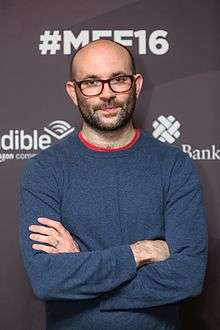Robert Greene (filmmaker)
Robert Greene (born May 25, 1976) is an American documentary filmmaker, editor, and writer. His documentaries include Kate Plays Christine, Actress, and Fake it So Real. He was named one of the 10 Filmmakers to Watch in 2014 by The Independent,[1] and is "filmmaker-in-chief" at the Murray Center for Documentary Journalism at the University of Missouri, beginning in 2015.[2]
Robert Greene | |
|---|---|
 | |
| Born | May 25, 1976 |
| Occupation | Film director, Editor, Producer, Professor |
| Years active | 2002–present |
Life and career
Greene was born in Charlotte, North Carolina. He received his bachelor's degree from North Carolina State University in 2000, majoring in Communication and Multidisciplinary Film Studies. He received his M.F.A. at City College of New York in Media Arts Studies. During his studies in New York he worked at Kim's Video. In 2002, Greene began working at 4th Row Films, starting as freelance editor. In 2004 he began working a full-time as a post-production supervisor. During this time, he worked with producers Douglas Tirola and Susan Bedusa on films including All In: The Poker Movie (2008), Making the Boys (2011), and An Omar Broadway Film (2008). While he was at 4th Row, Greene directed and produced Owning the Weather (2009) and Kati with an I (2010).
In 2011 he released Fake It So Real, his third feature as director, a documentary following a Lincolnton, North Carolina independent wrestling group over the week leading up to a big show.[3] In 2012 he left 4th Row Films to work on independent projects. In 2014 he directed Actress, a documentary about actress Brandy Burre as she attempts to return to her acting career after abandoning it to concentrate on raising a family.[4] In 2016 he directed Kate Plays Christine, a more experimental work[5] depicting actress Kate Lyn Sheil's preparations to portray the role of Christine Chubbuck, a real-life news reporter who took her own life on national television in 1974.
Green has worked with Sean Price Williams and Alex Ross Perry, having edited Perry's feature film Listen Up Philip,[6] as well as Amanda Rose Wilder's documentary Approaching the Elephant,[7] and Nick Berardini's Tom Swift and His Electric Rifle.[8] In 2015 Greene was appointed filmmaker-in-chief at the new Jonathan B. Murray Center for Documentary Journalism at the University of Missouri in Columbia, MO. He is also an assistant professor in their Journalism and Film Studies programs.
He is a writer, critic and reviewer, contributing regularly to Sight & Sound[9] as well as to other print and online publications including Filmmaker,[10] Criterion,[11] and Criticwire. Present Tense: Notes on American Nonfiction Cinema 1998-2013, his first book, is slated for release by The Critical Press for July 2015.[12]
Influences
Greene cites a variety of filmmakers and directors as influences for his work, including Frederick Wiseman, Albert and David Maysles, Rainer Werner Fassbinder, Jean-Luc Godard, John Cassavetes, and Kon Ichikawa. Greene has called Peter Watkins' Edvard Munch his favorite film of all time.[13]
For Actress, Greene was interested in Wiseman and Douglas Sirk for their mastery of visuals and definitive style, on how their influence could be incorporated in telling Burre's story.[14]
Filmography
As director
- Bisbee '17 (2018)[15]
- Kate Plays Christine (2016)
- Actress (2014)
- Fake It So Real (2011)
- Goodbye Engineer (2011)
- Kati With an I (2010)
- Owning the Weather (2009)
As editor
- Tom Swift and His Electric Rifle (2015)
- Queen of Earth (2015)
- Listen Up Philip (2014)
- Christmas, Again (2014)
- Approaching the Elephant (2014) (also producer)
- If You Take This (2014) (also producer)
- The Vanquishing of the Witch Baba Yaga (2014) (additional editing)
- Hellaware (2013) (additional editing)
- Hey Bartender (2013)
- Lenny Cooke (2013)
- All In: The Poker Movie (2012)
- Making the Boys (2011)
- An Omar Broadway Film (2008)
References
- Archambault, Sara. "10 Filmmakers to Watch in 2014: Robert Greene - Independent Magazine." Independent Magazine. May 11, 2014.
- "University of Missouri School of Journalism." Noted Documentary Filmmaker Joins the Missouri School of Journalism Faculty. August 6, 2014.
- "Fake It So Real (2011) - IMDb". IMDb. Retrieved September 20, 2017.
- "Actress (2014) - IMDb". IMDb. Retrieved September 20, 2017.
- Hynes, Eric (July 2016). "Kate Plays Christine and the New Journalism". Film Comment. Retrieved September 20, 2017.
- "Full Cast & Crew." IMDb.
- "Filmmakers | Approaching the Elephant." Approaching the Elephant.
- "Tom Swift and His Electric Rifle | Tribeca Film Festival." Tribeca.
- "Robert Greene". Sight & Sound. Retrieved January 13, 2020.
- Greene, Robert. "Robert Greene | Filmmaker Magazine." Filmmaker Magazine.
- Greene, Robert. "Hoop Dreams: The Real Thing." Hoop Dreams: The Real Thing. March 15, 2015.
- Greene, Robert. Present Tense: Notes On American Nonfiction Cinema, 1998-2013. Drescher, PA: Criterion Press, 2015.
- Greene, Robert, and Joshua Handler. "Roboapocalypse: From the Mouths of Filmmakers: Robert Greene." Roboapocalypse. November 3, 2014.
- Greene, Robert, and Joshua Handler. "Roboapocalypse: From the Mouths of Filmmakers: Robert Greene." Roboapocalypse. November 3, 2014.
- Chang September 25, 2018, Justin. "Review: Robert Greene's 'Bisbee '17' hauntingly explores the memory of a small-town tragedy". Los Angeles Times.
For all its teasing intellectual layers, “Bisbee ’17” is fairly unambiguous about where it stands. Its most persuasive arguments frame the conflict as a case of human rights being devoured by an unholy maw of rapacious capitalism and undisguised xenophobia. ... Greene frames his subjects with sly formal detachment, often keeping them at a visual distance and letting the camera run for several moments before or after someone has spoken. ... If that makes “Bisbee ’17” sound like a curious, hyper-alliterative fusion of Bertolt Brecht and Busby Berkeley, its experimentation never feels forced or alienating. On the contrary, one of the pleasurable discoveries of this continually surprising movie is that artifice can be the most direct route to the truth.